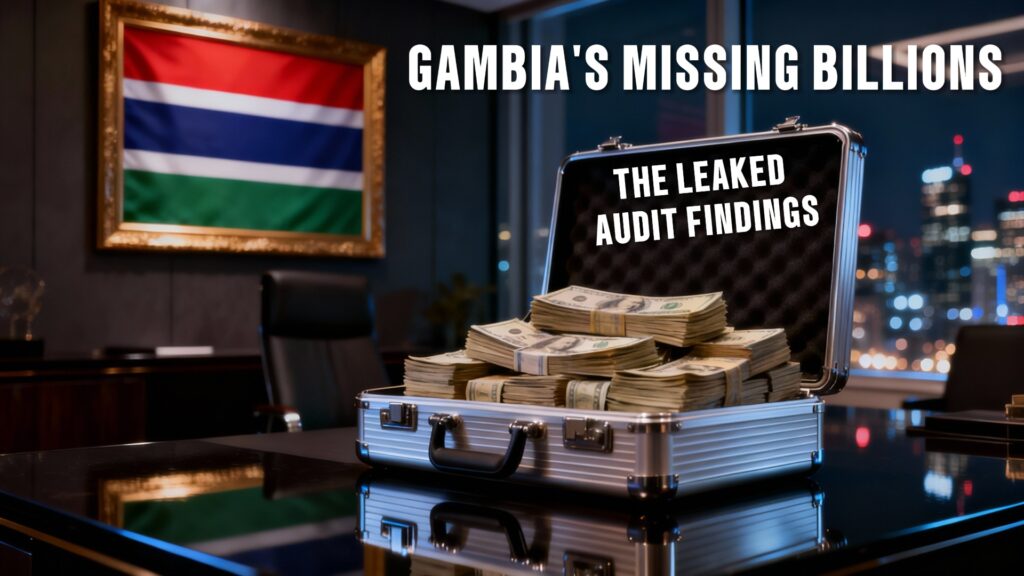
Minister Seedy Keita says 2023 spending was “broadly in line with the approved budget.” Sounds neat. But when you open the Auditor General’s files, the picture is messier: un-budgeted payments, misclassified spending, contracts without competition, delayed projects, tax not deducted, payment vouchers not produced, imprests not retired, and arrears tucked into the wrong places. In 2023 alone, the audit team logged 90 high-priority weaknesses on the spending side, the most serious grade they give.
Below, I unpack the biggest expenditure-side red flags across 2021–2023, with names, dalasi values, and plain-English explainers you can read on the radio, share in WhatsApp groups, or take to FPAC. (Total central-government spending ≈ D22.1 bn (2023), D21.6 bn (2022), D21.7 bn (2021).)
2023: “Aligned with the budget”? The audit says: not so fast.
1) Un-budgeted & misallocated spending
Un-budgeted items = Government spending on things not approved in the national budget. Think home: You promised rice, transport, and school fees, then secretly bought a TV, which was not in the plan. Problem: Parliament didn’t approve it. This hides priorities and invites waste.
• Un-budgeted payments: D12,273,035 posted anyway (about 0.06 % of 2023 spend).
Contingency misuse = Money for emergencies (floods, epidemics) used for ordinary bills. Think home: You eat your emergency savings on data bundles, and when a real emergency hits, you’re empty.
• Utilities charged to the Contingency Fund: D138,716,898 — the rainy-day vote used like a regular utility wallet (about 0.63 %).
Off-IFMIS/off-ledger = Spending outside the official financial system. Think home: paying from a secret tin, not the family bank account. Problem: complex to audit; easy to hide.
• OP–OIC “soft loan”: D32,500,000 went out, OIC then “repaid” vendors outside IFMIS, with the balance sent to a Security Adviser account, i.e., off-ledger.
2) Capital projects bleeding value
Office of the President — Banquet Hall
• Overpayment/price inflation: D9,802,232.80.
• Duplicate AC payments: D1,891,500 and D1,400,000.
• 5 % retention paid ~11 months early, missing addendum approvals; and single-sourcing despite GPPA saying OP did not meet single-source conditions.
Ministry of Youth & Sports — Independence Stadium
• Advance paid at 55 % (above the 50 % cap).
• D1,000,000 overpayment to CFTM (Phase II).
• Phases extended without tender; Phase II bid files were not provided, there was duplication of work, D15,977,000 paid for items were later demolished in Phase III, and there was no inventory for removed materials.
• Earlier advisory: CFTM is a marketing firm newly registered for construction. KOFA bid D22 m less, and the warning was ignored.
National Road Authority (NRA)
• Kiang West Road, Phase 2 (GAI Enterprise, ~48 km): D857,841,842.15 awarded without open competition (there was a GPPA “no-objection,” but auditors still flagged the lack of competitive tender). ≈ 3.9 % of 2023 spend.
• North Bank Lot 1: The audit demands reconciliation for a 22-month delay and a D377,696,321.87 gap between contract sum and payments. ≈ 1.7 % of spend. (Note: This D377.7 m relates to North Bank Lot 1, not Kiang West/GAI.)
Quick explainers for readers:
• Retention paid early: Government keeps ~5 % till defects are fixed, paying it early removes leverage.
• Single-source vs. competitive tender: No competition → higher prices, lower quality.
• “No-objection” ≠ is the best value; it means GPPA didn’t block and is not proof of value-for-money.
• Advance-payment cap: Limits (e.g., 50 %) reduce risk, significant advances + weak supervision = money out, little to show.
3) Payroll & allowances: the rule in one line
On secondment, your government salary stops, the host pays you, and you must pay 25 % of your government basic to the Treasury monthly, with no double salary and no missed remittance. Dual payments to seconded officers amounting to D215,866 were noted. Officers continued receiving wages from their original votes while also being paid by the host institutions
Salary upgrades without promotion letters:
If pay goes up, there must be a promotion/upgrade letter (with PSC approval), an effective date, and a payroll change form tying the new grade/step to the budget head. When increments happen without that paperwork, it’s unearned and recoverable. In 2023, auditors found D480,738.30 in increments without supporting approval.
Unrecovered staff loans:
The auditors found D2,500,068.49 in staff loans that were never repaid. There was no repayment schedule or monitoring, and some borrowers’ HR files were missing.
The government lent money to its employees and forgot to collect it back. Think home: you lend your brother money for a trip, he never pays you, and you move on. Multiply that by a thousand taxpayers. It’s not only wasteful, it’s unfair to honest civil servants who follow the rules.
4) Taxes not deducted from suppliers
Withholding tax wasn’t deducted on some payments (e.g., ICEWARP email platform D261,140.00, plus D1,490,457.98 under “Use of Goods & Services”). The government should be the first to obey tax law; skipping WHT gives suppliers more, cheats GRA, and breaks the rules.
(To be continued in Part 8 — The Missing Vouchers, Unretired Imprests & Road Contracts)
Making the Audit Speak for the People
By Jallow Modou, Washington, D.C – Financial Analyst


